In the evolving landscape of cybersecurity, the advent of quantum computers poses significant challenges to traditional cryptographic systems. As these powerful machines proliferate, they threaten to undermine the very foundations of digital security. Enter post-quantum cryptography (PQC)—an emerging field that seeks to fortify our defenses against this new cadre of technological threats. From a Christian perspective, the implications of PQC extend far beyond mere technological advancements; they delve into the ethical and moral responsibilities that accompany our stewardship of God’s creation.
To understand the significance of post-quantum cryptography, it is essential first to explore the basic principles of quantum computing. Unlike classical computers, which use bits as the fundamental unit of information, quantum computers utilize qubits. This allows them to perform complex calculations at unprecedented speeds. The power of quantum computing threatens to render current encryption standards, like RSA and ECC, obsolete. Such transformations demand a new paradigm for security that PQC aims to establish.
Importantly, PQC seeks to develop cryptographic systems that are secure against both classical and quantum attacks. To this end, researchers are exploring a variety of algorithmic approaches, including lattice-based cryptography, hash-based cryptography, multivariate polynomial cryptography, and code-based cryptography. Each of these methods offers unique strengths and weaknesses, and their continued development is crucial in the race against emerging quantum threats.
From a Christian viewpoint, the urgency of implementing PQC can be viewed through the lens of our moral imperative to protect and preserve the integrity of information. The scriptures admonish us to be good stewards of our resources, which in today’s digital age includes safeguarding personal data, sensitive communications, and confidential transactions. Ensuring the security of this information is paramount not only for individual privacy but also for upholding justice and trust within communities.
The Ethical Dimensions of Post-Quantum Cryptography
As Christians, our engagement with technology should also be framed within an ethical context. The potential threats posed by quantum computing challenge us to consider the implications of our technological choices. The advent of PQC provides an opportunity to engage with these issues proactively rather than reactively. When considering the development and deployment of PQC, we must ask ourselves: How can we leverage these advancements to benefit society? How can we ensure that the technology is accessible and not used for nefarious purposes?
These questions are particularly pertinent given the inherent nature of information systems. With the rise of cybercrime, the misuse of personal information can lead to significant harm. In this context, PQC not only serves as a technological safeguard but as a tool for promoting social justice and protecting the vulnerable. Christians are called to stand against inequity and exploitation, making it crucial to advocate for technologies that fortify security against malicious actors.
Technological and Theological Hope: The Role of Community in Cyber Defense
As communities grapple with the implications of quantum threats, the implementation of PQC offers a promising avenue for collaboration. The development of robust security protocols necessitates collective efforts from technologists, ethicists, and faith communities. By fostering dialogue between various stakeholders, we can work towards creating an inclusive framework for cybersecurity that respects individual rights while addressing the complexities of digital security.
This collaborative effort resonates with Christian doctrine, which emphasizes the importance of community. In a world where technology can often isolate individuals, the communal aspect of cybersecurity can serve to reinforce the Christian teachings of love and support for one another. Cyber defenses can be seen as an extension of the Biblical command to care for the well-being of our neighbors. Thus, by investing in PQC, we not only protect our data but also uphold our commitment to the greater good.
Future Directions: The Role of the Christian Faith in Technological Innovation
As the National Institute of Standards and Technology (NIST) implements a timeline for PQC standards—anticipated to culminate in 2024—Christians are positioned within a pivotal moment in technological evolution. Embracing this shift requires a commitment to stay informed and engaged with advancements in cryptography. As these standards become mainstream, the necessity for education and awareness among individuals and congregations will only grow. Ignorance of technological realities poses its own risks, making it essential to cultivate a knowledgeable community that can navigate these complexities.
Furthermore, as society moves toward a future where quantum capabilities are commonplace, it becomes imperative to consider how faith can inform and guide our approach to such innovations. The interplay of science and faith offers a unique platform to evaluate technological impacts directly through ethical lenses steeped in Biblical teachings. The call to be “wise as serpents and innocent as doves” can apply to our interactions with emerging technologies like PQC, where wisdom and discernment are crucial in decision-making.
Post-quantum cryptography stands at the intersection of technology and morality. From the perspective of stewardship, the implications of PQC extend to broader discussions about security, justice, and community welfare. As Christians engage with the future of cyber defense, it is vital to recognize our responsibility to harness these advancements for the greater good, ensuring that they become instruments of protection and empowerment, rather than tools of division or fear. Working together, humanity can forge a secure digital future that aligns with the biblical call to love, protect, and serve one another.








Leave a Comment